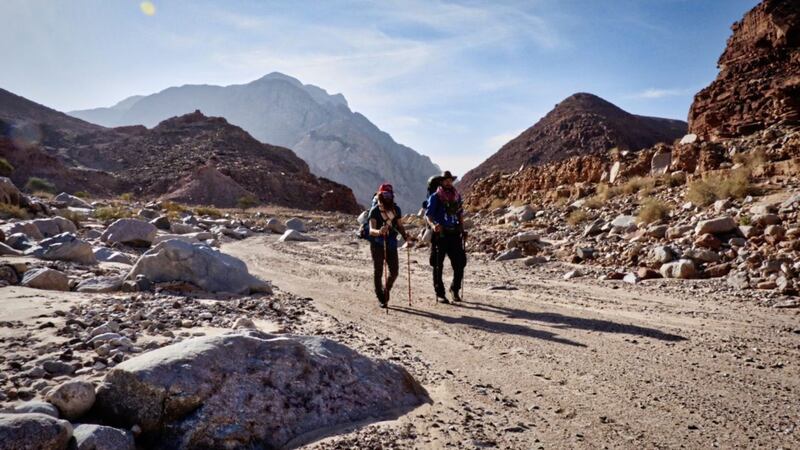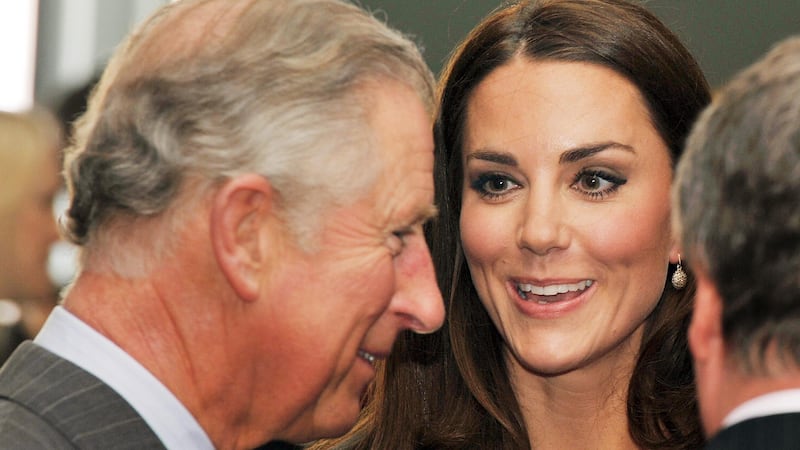ADVENTURER, story-teller and film-maker Leon McCarron doesn't know what it's like to do 'ordinary' holidays, although when he returns from one of his long-distance expeditions, he must often feel in need of one.
For someone, though, who has slept under the stars in the Sinai desert in Egypt, with only a couple of friendly Bedouin tribesmen and a camel for company, lying on a sunbed around a crowded hotel pool might fall short of the mark.
The Co Derry lone traveller, who has made a career out of documenting his offbeat trips, has written a new book recounting his visit to the Middle East last year, during which he walked 1,000 miles from the divided city of Jerusalem, through the Israeli-occupied West Bank, then Jordan, and the Sinai Desert in Egypt.
With regard to the last stop and the aforementioned Bedouin, he tends to do that a lot – gather up locals who invariably invite him into their homes and make sure he is adequately fed, watered and washed before setting him on his way again.
"They must see me as a friendly Irishman and it is their duty to look after me, despite the fact I look like an odd, smelly, bearded creature most of the time," he jests, during a rare rest period in his adopted home of west London.
His last trip lasted five and-a-half months and, three pairs of walking boots later, the 31-year-old has not only survived wild hiking trails, political turmoil, desert temperatures and a grisly mass sacrifice (of sheep), but has returned even more enthused about life and humanity than ever.
"I was really fascinated by life in the West Bank and how the people I met really wanted peace and presented a hopeful account of the future," says the Castlerock author of The Land Beyond; A Thousand Miles on Foot through the heart of the Middle East, published last month.
"When you depoliticise a place, you find people are willing to communicate, so while I might have heard a bitter grievance during a short conversation with someone at a bus stop, I heard the extended story when I stayed overnight with people in their homes. They would talk about their life, about their olive groves and the things they might accept in any future territory settlement.
"Life is hard for Palestinians and they live with real fear; but the Israelis too live with real fear for their security. From a distance, people tend to choose a 'side', but, coming from Northern Ireland and having attended a Catholic primary school and Protestant grammar, I think I was a bit of an outsider myself, so that helps me to see both viewpoints.
"Most places with an 'image' problem seem misunderstood and dangerous, but, when you scratch beneath the surface, you find a human connection and genuine friendliness."
The highlight in the West Bank for McCarron, who still calls Castlerock home, was a "fascinating" sojourn with the Samaritans, one of the oldest and smallest religious sects in the world, whose membership amounts to just 802.
"I was given a grant from the Geographical Society in London to go back and live with the Samaritans for a month and it was a truly fascinating experience," he recalls. "They live on the top of a sacred mountain and, although they are close to Judaism in beliefs and practises, they are a distinct group in their own right.
"The Samaritans charity was named after them and they are an Abrahamic religion who still chant in ancient Hebrew and practise the religious ritual of animal sacrifice. I was there for the Festival of Pesach, or Passover, last year when 52 sheep were sacrificed, skinned, gutted and then cooked in an underground oven.
"It was sort of brutal to watch and I had to forget about my 23 years of being a dedicated vegetarian."
By far the most frightening experience, though, was running out of water during his travels and having to trek deep into the night over rough, steep terrain to reach the next river.
"It was pretty touch-and-go and I was very dehydrated by the end," he says, a little casually, given the possible consequences.
So, even a Fellow of the Royal Geographical Society, winner of the 2017 Neville Shulman Challenge Award (which aims to further the understanding and exploration of the planet) can make the occasional slip-up when packing emergency supplies?
"I guess I am a pretty happy-go-lucky kind of person," he reflects, "although, having said that, I generally won't take uncalculated risks. I will be aware of certain flashpoints and I do make a point of doing my homework first to make sure I'm not walking into an active war zone."
Despite this, his mother still worries back in Co Derry about her wandering son, who first set off on his world travels on a bicycle (14,000 miles from New York to Hong Kong) after completing a degree in film studies at Kent University and not quite knowing what to do with it.
Since then, he has walked, cycled, or travelled on horseback in countries including China, Canada, Iran, Argentina and Patagonia, learning a little more about the world's cultures and religions along the way – and most importantly, the richness of its poorest people.
If he misses any of the small luxuries usually found in the suitcase of a conventional holiday traveller, he's certainly not letting their absence keep him awake at night, although the older he gets, the more he appreciates "good kit" for the road ahead.
"I've gotten a bit geeky about equipment when before I wouldn't have thought of it," he reflects. "When you're walking so much, anything from 10 miles to 40 miles per day, you do need the right socks and boots. You put your body through the ringer at different points. I must be getting sensible; I didn't used to think like that."
In human terms, McCarron regrets the loneliness that often comes with treks to dangerous, isolated places and finds himself craving a bit of lively banter to lighten the mood when the going gets tough for mind, as well as body.
"I always meet new and interesting people, but sometimes I just miss the familiarity of talking to someone who knows you really well," he admits. "But, when you get to walk through the lush green calmness of Jordan and roll your mat out and sleep under the stars in the Sinai, I won't stress too much about the silence.
"If I wasn't doing this, I think I would like to have been a postman because you still get to chat to interesting people while you walk – as well as the adrenalin rush of running away from their dogs."
:: The Land Beyond; A Thousand Miles on Foot through the heart of the Middle East is published by IB Tauris and a three-part film series will be available later in the year.




